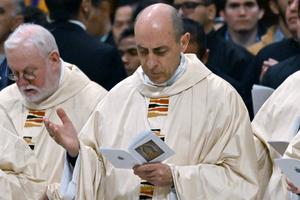Two German Bishops Laud Vatican’s Affirmation That Church Has No Authority to Bless Same-Sex Unions
The Congregation for the Doctrine of the Faith emphasized that blessings are sacramentals, and that as such, they can only be imparted on that which conforms to the nature of sacramentals.

VATICAN CITY — Two German bishops have welcomed the Congregation for the Doctrine of the Faith’s reassertion of Church teaching that ecclesial blessings of same-sex unions cannot be considered licit, saying they were grateful for the clarification it contains.
Bishop Rudolf Voderholzer of Regensburg, who has been a strident critic of the German bishops’ Synodal Path, which, among other proposals, has been pushing the possibility of allowing such blessings in Germany, said in a statement on Monday that the Vatican “has made it clear that the Church does not have the authority to bless same-sex partnerships.”
“I welcome the responsum of the Congregation for the Doctrine of the Faith and thank it for the clarification it contains,” he said.
Bishop Stefan Oster of Passau said the question of blessing same-sex unions is “currently of great concern” in Germany and worldwide and so he was “grateful” for the Vatican’s clarification, hoping it would provide “orientation and therefore promote greater unanimity.”
On Monday the Vatican issued a formal response to a dubium, or question, about whether the Church has the authority to bless same-sex unions. The answer, it said, was “negative,” and gave a two-page explanation approved by Pope Francis and published in seven languages.
Cardinal Luis Ladaria, prefect of the Congregation for the Doctrine of the Faith and Archbishop Giacomo Morandi, its secretary, who jointly signed the response on Feb. 22, stressed that blessings are sacramentals, and that as such, they can only be imparted on that which conforms to the nature of sacramentals.
Drawing on Church documents, the Vatican’s response added that same-sex unions, like heterosexual relationships involving sexual activity outside marriage, are “not ordered to the Creator’s plan” and so the “blessing of homosexual unions cannot be considered licit.” It also stressed that the Church rejects “any unjust discrimination,” and welcomes people with homosexual inclination “with respect and delicacy.”
Bishop Voderholzer said the CDF had “made it clear that the Church does not have the authority to bless same-sex partnerships,” and noted that Pope Francis had “approved the publication of the document and accompanying clarifications.”
Quoting from Amoris Laetitia, Pope Francis’ 2016 post-synodal apostolic exhortation on the family, the bishop said although all people should be “respected in his or her dignity and treated with consideration,” he highlighted Paragraph 251 of the document, which states “there are absolutely no grounds for considering homosexual unions to be in any way similar or even remotely analogous to God’s plan for marriage and family.”
Bishop Voderholzer said that similarly, the Vatican’s response was keen to “avoid analogies and similarities” with the covenant of marriage, and he quoted from the Second Vatican Council’s pastoral constitution on the Church in the modern world, Gaudium et Spes (48), which states the“institution of matrimony itself and conjugal love are ordained for the procreation and education of children and find in them their ultimate crown.”
Although they did not mention the German bishops specifically, Cardinal Ladaria and Archbishop Morandi said it was given in light of “plans and proposals” being advanced for the blessings of same-sex unions.
The head of the German bishops’ conference, Bishop Georg Bätzing of Limburg, has been at the forefront of these efforts.
In 2019, Bishop Bätzing invited diocesan representatives to discuss the matter of Church blessings for same-sex couples or those in relationships that cannot be married in the Church. The process was led by Beata Gilles, now the bishops’ conference general secretary. In 2020, Bishop Bätzing told a German newspaper that “if people decide for themselves how they live, can’t we tell them that their relationship is blessed by God?”
He responded to the Vatican document by saying “there are no easy answers to questions like this.”
Bishop Bätzing added that discussions have taken place “for a long time” in Germany and in other parts of the Church on how this “teaching and doctrinal development in general can be advanced with viable arguments — on the basis of fundamental truths of faith and morals, progressive theological reflection, and also in openness to more recent results of the human sciences and the life situations of people today.”
The Synodal Path, he argued, seeks to discuss this topic “in a comprehensive way” while also considering “the necessity and the limits of ecclesial doctrinal development.” Therefore, the points presented by the CDF, he added, “must and naturally will find their way into these discussions."
A significant influential force behind the bishops is the Central Committee of German Catholics (ZdK), which is also directing the Synodal Path. In 2015, it published a declaration calling for new “liturgical forms, in particular blessings of homosexual partnerships” and “unconditional acceptance” of homosexual unions. In 2018, CNA reported that Thomas Sternberg, the co-president of the Synodal Path and the ZdK, reiterated his appeal for blessings of same-sex unions.
Many other German bishops have also voiced their support for Church blessings of same-sex unions, including Bishop Peter Kohlgraf of Mainz who recently publicly defended a book of blessings and rites for homosexual unions, and Bishop Helmut Dieser of Aachen, the chairman of the Synodal Path’s forum on sexuality. He said last year he would be satisfied if relationships not resulting in marriage were recognized as an attempt to live in love with someone, rather than in sin.
In 2018, the deputy chairman of Germany’s bishops’ conference, Bishop Franz-Josef Bode, initiated the discussion on same-sex union blessings, saying a “blessing does not need to be confused with a wedding.”
- Keywords:
- same-sex unions
- germany


















